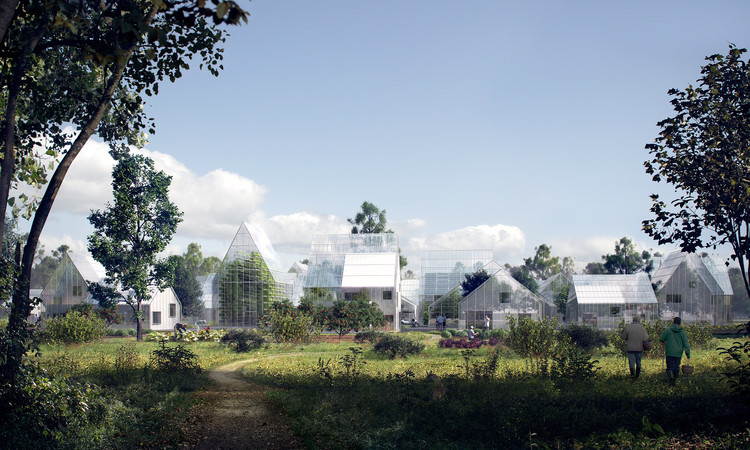
An innovative new housing model dubbed ReGen Villages (short for regenerative) has been developed in response to some of the world's most pressing environmental, social and economic issues. Helmed by Dutch holding firm ReGen Villages B.V. and Copenhagen-based architecture firm EFFEKT, the new model facilitates off-the-grid, self-sustaining communal neighborhoods that can be deployed across the globe. The first project site will be in Almere, the Netherlands, with work starting this year.

The increasingly unavoidable facts about global warming, population growth, global food crisis and scarcity of resources lead the project team to consider how a holistic development could offset the dangerous consequences of human inhabitation. One of the largest drivers of environmental destruction and the loss of biodiversity remains the agricultural industry, and so the project team has used a sustainable agricultural model to drive forth the input based system of design.

Urban dwellers across the world work hard to pay the commodities of their homes, such as mortgage, energy, water and heating, cooling and food. We envision homes that work for you, producing clean energy, water, food off the grid at affordable land prices outside our big cities, says Sinus Lynge, co-founder of EFFEKT.
The concept combines a variety of innovative technologies, such as energy positive homes, renewable energy, energy storage, door-step high-yield organic food production, vertical farming aquaponics/aeroponics, water management and waste-to-resource systems. Lynge explained in a press release: “ReGen Villages is all about applied technology. We are simply applying already existing technologies into an integrated community design, providing clean energy, water, and food right off your doorstep."

Whilst half of the global population currently lives in cities, the efficiency of the ReGen systems could reduce a household's dependency on high-frequency urban living. This would open up a new wave of peri-urbanism and rural development, allowing a more sustainably distributed density of people across the planet's surface. This distribution would also ease the burden on municipal and national governments who are currently buckling under the pressure of their overpopulated areas.

This redistribution of density fosters "a model that adds not only environmental and financial value but also social value by creating the framework for empowering families and developing a true sense of community, reconnecting people with nature and consumption with production." It brings back a sense of achievement that accompanies the environmental and social benefits, making it a more sustainable long-term model.

After enlisting the backing of sovereign wealth funds looking for sustainable investments, ReGen will acquire suitable areas of land and begin contracting local consultants to help tailor the model to the local environment. The housing model is therefore optimized for the conditions at hand, with different technologies being applied accordingly.

After featuring in the Danish architectural pavilion at this year's Venice Biennale, the first ReGen Village pilot community is to be developed in Almere in Netherlands, with 100 homes breaking ground in 2016. Other project sites in the near future include Sweden, Norway, Denmark, and Germany, with plans to expand onto multiple continents - into countries that feel vastly different consequences from the global crises - in the very near future.
Architects
Location
Almere, The NetherlandsCollaborators
James Ehrlich, ReGen Villages, Holding B.V.Area
15500.0 m2Project Year
2016Photographs
Courtesy of EFFEKTArchitects
News via EFFEKT.































































